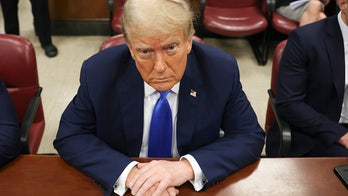Uncle Sam hasn't quite become the world's deadbeat borrower but the latest economic forecast is raising some alarms.
Some financial experts think ballooning deficits and a surge in spending are putting the U.S. at risk of losing its triple-A credit rating.
Credit ratings determine how much it costs for governments or corporations to borrow money. A triple-A rating is the highest rating available; conversely, junk status is the lowest.
A downgrade on U.S. credit would make it more costly for the government to borrow money, leading to bigger returns for investors and higher interest rates in the private sector for businesses and individuals. That could also lead to a decline in investment spending and drag the economy's growth down, leading to fewer profits and incomes for the government to tax.
On Friday, the dollar dropped to its lowest level this year and was on track for its biggest weekly fall in two months on concerns about the country's rating status, despite an assurance from Moody's on Thursday that it was comfortable with the current rating on the U.S., which has held a triple-A rating since 1917.
To ease concerns, White House spokesman Robert Gibbs said he doesn't believe the U.S. credit rating will be cut.
President Obama likes to say he inherited a financial mess, an argument that is supported by the $1.3 trillion deficit left on his lap by the previous administration. But under his watch, Obama has pushed the estimate for this year's deficit to a record $1.8 trillion, partly as a result of his $787 billion stimulus package. The deficit is equal to about 13 percent of the nation's gross domestic product.
Gibbs says that Obama is working to push that initiative full speed to create jobs and fix the economy.
"Short-term, the way to bring down the deficit is to get this economy moving again," Gibbs said. "Medium-to long-term, we have to get our fiscal house back in order, and that's why the president was pleased that Congress passed a budget that cuts the deficit in half in four years."
But others aren't as certain that the U.S. credit rating is safe.
David Walker, former director of the Government Accountability Office, cited a warning from Moody's Investor's Service more than a year ago about rising health care and social security costs.
"The facts show we're in even worse shape now, and there are signs that confidence in America's ability to control its finances is eroding," the former comptroller general and current CEO of the Peter G. Peterson Foundation, wrote in the Financial Times this month.
Walker noted that prices have risen on credit default insurance on U.S. government bonds, "meaning it costs investors more to protect their investment in Treasury bonds against default than before the crisis hit."
Walker called on the Obama administration and Congress to create a "fiscal future commission" to help put the country's financial house in order, a move that he says Americans want by a 2-1 margin, according to research by his foundation. But he expressed skepticism that it would happen.
"Yet Washington still sleeps, and it is clear that we cannot count on politicians to make tough transformational changes on multiple fronts using the regular legislative process," he wrote. "We have to act before we face a much larger economic crisis. Let's not wait until a credit rating downgrade. The time for Washington to wake up is now."
The Moody's report said the U.S. could lose its top credit rating within a decade unless it takes bold action to control soaring health care and social security spending.




